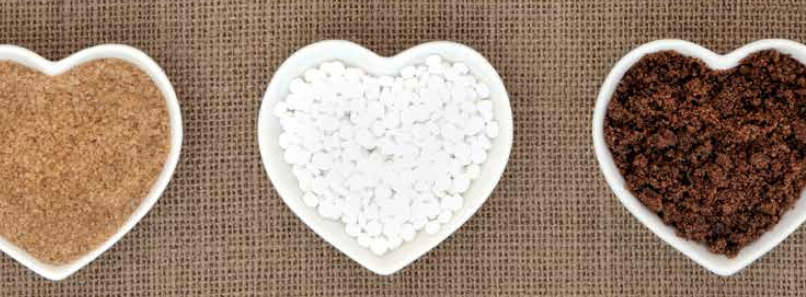
Do you really need to live sugar free?! I recently wrote an article all about sugar and health for the Spring edition of Superfoods Magazine (on sale 24th Feb!) and wanted to share it with you on my blog. I’ve included everything that you need to know about sugar and your diet below along with two videos featuring my top three sugar myths as well as my BBC Breakfast interview discussing sugar in our diets and food labelling. I really hope you enjoy them and find this blog post useful!
With more and more people watching their weight and what they eat, combined with listening to mainstream media, sugar can easily be demonised and unfortunately in many cases, feared. A small amount of sugar in our diets though isn’t actually ‘bad’ for us..
- Sugar Explained
There are three main types of sugar; two are naturally occurring and are found in fruit (fructose) and milk (lactose), and the third is added sugar (sucrose) which is table sugar.
Sucrose is a disaccharide (two sugars) of glucose, which provides energy, and fructose. Sucrose is classed under the term ‘free sugars’, which is defined as “any sugars that are added to food or drinks, or sugars which are found naturally in honey and unsweetened fruit juice”. Foods containing sucrose, such as fizzy drinks, sweets and biscuits are often high in calories and provide little in the way of other nutrients. Sugar (sucrose) is widely known as providing ‘empty calories’ as all table sugar provides is that; calories and nothing else.
Sugar is a carbohydrate and provides 4 calories per gram. A teaspoon of sugar provides around 20 calories, which in the grand scheme of things isn’t a lot. However it can easily add up; for example 5 cups of tea a day with 2 sugars provides an extra 200 kcal per day which could equate to a 20lb (~1.5 stone) weight gain in a year.
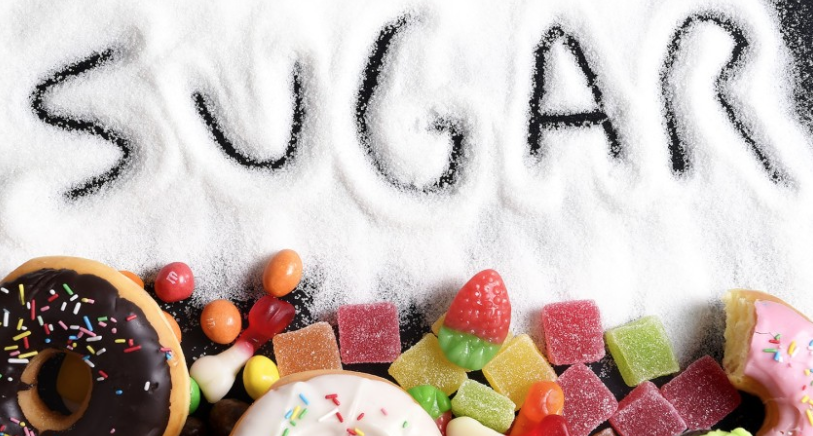
- Sugar Recommendations
The government recommends that ‘free’ or ‘added sugars’ should make up no more than 5% of an adult’s daily calorie intake from food and drink; this equates to approximately 30g of sugar (7-8 teaspoons). Children should have less; no more than 19g (5 teaspoons) a day for those aged 4 to 6 years of age, and no more than 24g (6 teaspoons) for those aged 7 to 10 years of age.
To put this into perspective, one can of full sugar fizzy drink can have as much as 35g (9 teaspoons) of sugar, which is over what an adult should have in an entire day, and nearly twice the amount that should be given to a child.
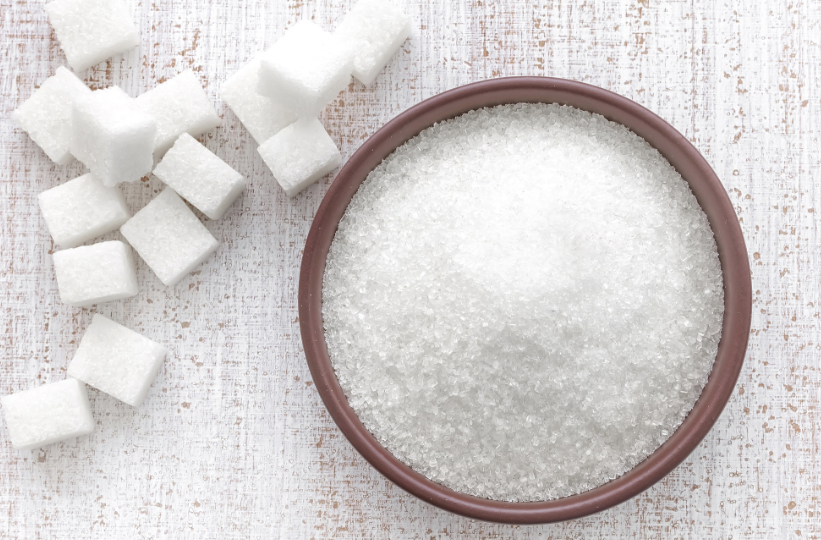
- Sugary Foods & Drinks
You can see how much sugar is in a product by reading the nutrition label and, if you look at the per 100g column, you will be able to see if the food is high (more than 22.5g of sugar per 100g is labelled red) or low (less than 5g per 100g is labelled green) in sugar. Anything in between these ranges is classed as ‘medium’ for sugar content and will be labelled orange.
Remember though that the figure given for the sugar content may include sugars from fruit (fructose) and milk (lactose), in addition to added sugar (sucrose). Check the ingredients list for added sugar (which could be labelled as cane sugar, sucrose, syrup or glucose!) and if it’s near the top then check out how much of it is in it.
Here are some products which contain added sugar:
- Sugar Myths
A quick ‘Google’ on the internet and you couldn’t be blamed for thinking that sugar is a highly toxic and addictive villain out to get you, and the single nutrient to be blamed for the obesity epidemic; fat no longer is the villain after all. But the internet, and often media, have a habit of blowing things out of proportion and not being completely truthful.
Here are my top 3 sugar myths which I’ve read recently:
1. Sugar is addictive; There is no evidence to suggest that sugar is physically addictive in humans, however sugar, to many people, taste good, which in turn stimulates feel-good hormones (endorphins). A perceived sugar or food addiction could be a sign of an ‘eating addiction’ which describes a behavioural, rather than substance addiction.
2. Sugar promotes weight gain on the stomach; Sugar consumption does not determine where you store body fat and sugar alone does not cause weight gain; an excess of calories consumed causes weight gain, no matter where it’s from! Weight gain on the stomach is largely down to genetics as determined by your parents, and stress levels.
3. Sugar makes you hungry; Sugar has a medium glycaemic index, meaning that moderate amounts of sugar won’t ’spike’ blood sugar (glucose) levels as many people would have us believe. What is important is the amount of sugar consumed and in what context. Whilst it’s true that sugary drinks won’t make you feel as full as eating food containing the same amount of calories, sugar alone doesn’t cause hunger; not eating enough nutritious food and a lack of sleep does that!
- Sugar Pros & Cons
There is no denying it, sugar tastes good, especially when combined with fat; ice-cream anyone?! Sugar is a great, and also cheap, way of adding sweetness to foods. Sugar also provides bulk and stability to baked goods, and keeps them moist too, stopping them from drying out too quickly.
On the downside though sugar causes tooth decay, especially when consumed frequently during the day. Fizzy drinks are often the main culprit as the longer that sugar is in contact with the teeth, the more damage that it can cause. The sugars found naturally in fresh fruit are less likely to cause tooth decay as the sugars are contained within the structure of the fruit, making fresh whole fruit a much better option than fruit juice or dried fruit which can have a tendency to stick to teeth. Sugar also contains calories and not many nutrients, which means if eaten to excess it could cause weight gain and possibly nutrient deficiencies if eaten at the expense of healthy whole foods such as fruit and vegetables.
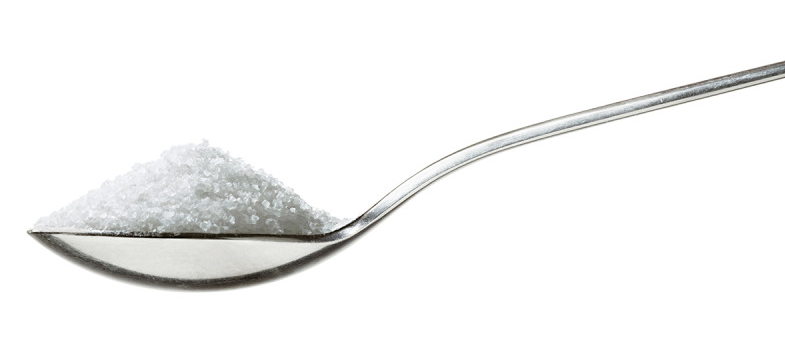
- Sugar Alternatives
Cutting down on added sugar is never a bad thing, and here are some things that you can do to cut down on the sweet white stuff:
1. Swap fizzy or sugar drinks for water, or no added sugar drinks.
2. Keep the amount of fresh 100% fruit juice that you drink to no more than 150ml a day.
3. Reduce the amount of biscuits, sweets and cakes that you eat; do your cupboards need a clear out?!. Opt for healthy snacks such as oat cakes with hummus or a handful of nuts instead.
4. Reduce the amount of sugar in hot drinks such as tea and coffee or switch to using a low calorie sweetener such as stevia, xylitol or erythritol.
5. Experiment in baking – mashed bananas or apple puree can be used to add sweetness instead of sugar.
6. Buy fruit tinned in juice rather than syrup.
7. Choose plainer cereals such as oats, rather than those coated in sugar, honey or chocolate.
8. Compare nutrition labels; choose products which have less added sugar i.e. green/amber on the nutrition label as opposed to red.
9. If you do buy sweets and chocolate, buy smaller packets of them.
10. Swap milk or white chocolate for dark chocolate and swap fruit yoghurt for plain yoghurt; you can always add whole fruit to sweeten.
You can see more of my BBC Breakfast appearances [here].
- Summary
The take-away message it to NOT fear sugar, or any food for that matter. No food is ‘toxic’ and no food magically causes weight gain. Take a look at your diet as a whole and if added sugars i.e. biscuits, sweets and sugar drinks, are featuring regularly then think about cutting down, and if you’re gaining weight then look at where excess calories may be creeping in.
Cutting out added sugar altogether isn’t necessary; a little bit of what you fancy does you good after all, but cutting down on it may be a good idea, for your teeth especially!
*I originally wrote this article for Superfoods Magazine.
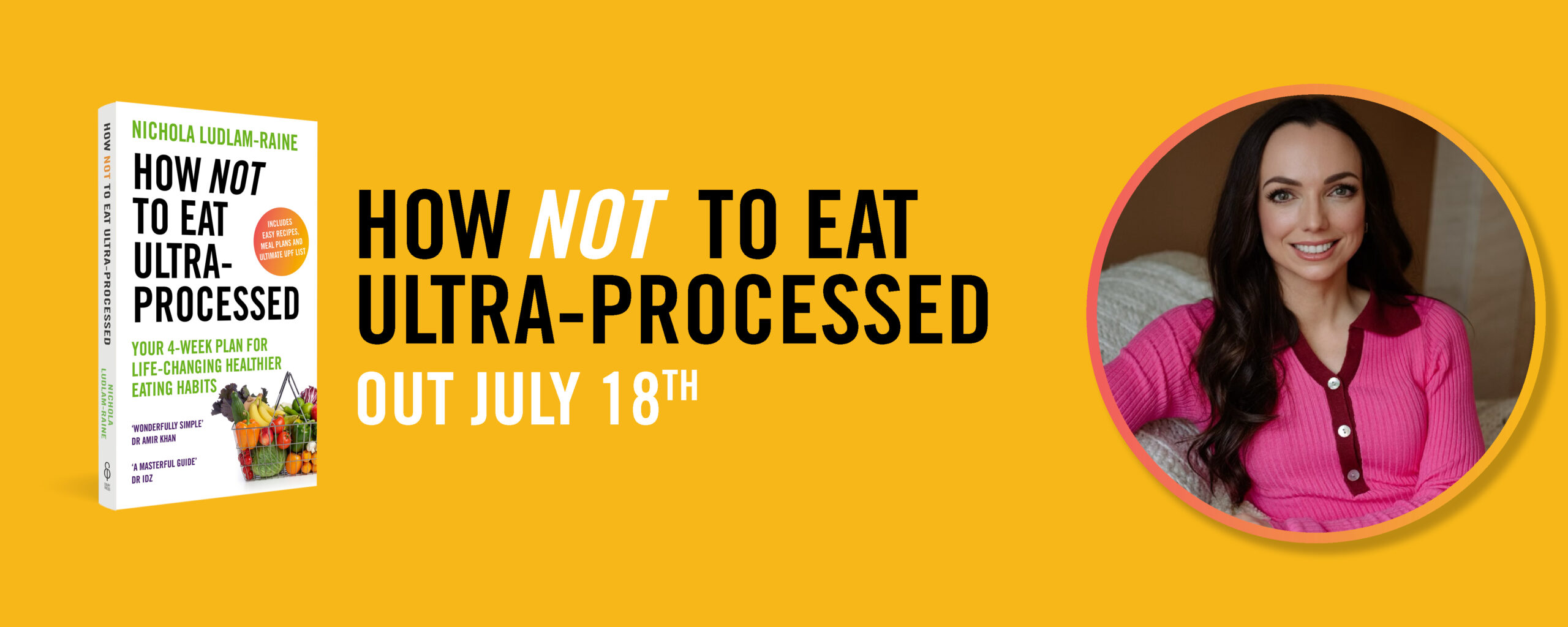
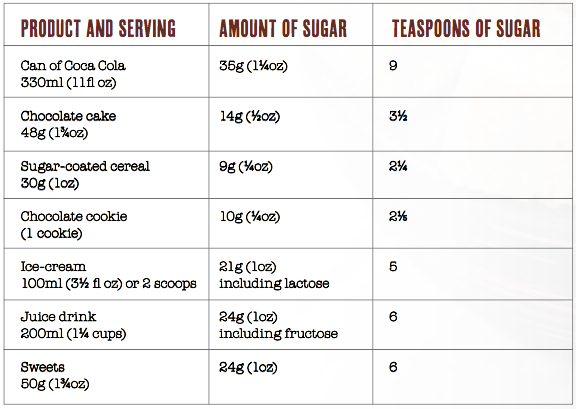
1 Comment